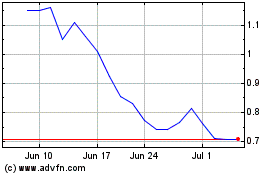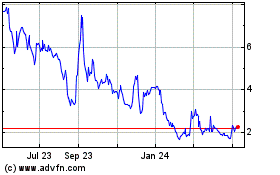Updates best practice advice to support
non-endoscopic esophageal precancer screening and significantly
expands target population to include, for the first time, at-risk
patients without chronic heartburn
symptoms
Lucid Diagnostics Inc. (Nasdaq: LUCD) (“Lucid”), a
commercial-stage, cancer prevention medical diagnostics company,
and majority-owned subsidiary of PAVmed Inc. (Nasdaq: PAVM,
PAVMZ) (“PAVmed”), today announced that a recently published
American Gastroenterological Association (“AGA”) clinical practice
update supports esophageal precancer (“Barrett’s Esophagus,” “BE”)
screening to prevent highly lethal esophageal cancer (“EAC”)
utilizing its EsoGuard® Esophageal DNA Test (“EsoGuard”) on samples
collected with its EsoCheck® Cell Collection Device
(“EsoCheck”).
The clinical practice update entitled “AGA Clinical Practice
Update on New Technology and Innovation for Surveillance,” the
first such update since 2011, was recently published online in the
journal, Clinical Gastroenterology and Hepatology. The expert
review was commissioned by the AGA’s Clinical Practice Update
Committee, its Center for GI Innovation and Technology, and
Governing Board to “provide timely guidance on a topic of high
clinical importance…” Senior author Srinadh Komanduri M.D., M.S.,
Professor of Medicine and Surgery, Associate Chief, Division of
Gastroenterology and Hepatology and Director of Endoscopy at the
Feinberg School of Medicine, Northwestern University, is a member
of Lucid’s Medical Advisory Board.
The AGA update mirrors the recently updated American College of
Gastroenterology (“ACG”) clinical guideline on the same topic, by
acknowledging the “significant need for noninvasive screening tools
that are easy to administer, patient friendly, and cost-effective
for the detection of BE,” and endorsing, for the first time, such
tools as an acceptable alternative to endoscopy to directly address
this need.
Best Practice Advice 2: Non-Endoscopic
Cell Collection Devices may be considered as an option to screen
for BE.
The clinical practice update specifically mentions EsoCheck,
along with Lucid’s EsophaCap® device, as such “Non-endoscopic Cell
Collection Devices” – the only such devices commercially available
in the United States – indicating that they “have demonstrated
excellent tolerability, safety, and sensitivity for the diagnosis
of BE.” The authors cite the seminal NIH-funded multicenter,
case-control study published in 2018 in Science Translational
Medicine, which demonstrated that EsoGuard is highly accurate at
detecting esophageal precancer and cancer, including on samples
collected with EsoCheck.
“We are gratified that the AGA has joined the ACG in updating
their clinical practice guidelines to recognize the role that
groundbreaking technologies, such as EsoGuard and EsoCheck, can
play in driving widespread esophageal precancer screening to
prevent esophageal cancer deaths,” said Lishan Aklog M.D., Lucid’s
Chairman and Chief Executive Officer. “We now have a consensus. The
two leading gastroenterology professional associations support the
use of our nonendoscopic tools as an acceptable alternative to
endoscopy – which has unequivocally failed as a screening tool
despite over a decade of clinical guidelines recommending screening
of at-risk patients. This ongoing failure to screen makes the
thousands of esophageal deaths in the U.S. each year a profound and
preventable tragedy, which we are determined to eliminate.”
The clinical practice update also significantly expands the
target population for esophageal precancer screening, including for
EsoGuard and EsoCheck, by recommending, for the first time,
screening in at-risk patients without
symptoms of reflux. The AGA does so by adding a history of chronic
gastroesophageal disease (“GERD,” commonly known as chronic
heartburn) as merely an additional, seventh, risk factor to the six
risk factors for BE and EAC that have traditionally identified
at-risk symptomatic patients recommended for screening. As a
result, chronic symptomatic GERD is no longer a mandatory
prerequisite and asymptomatic patients with three other risk
factors are now considered appropriate for screening.
Best Practice Advice 1: Screening with
standard upper endoscopy may be considered in individuals with at
least 3 established risk factors for Barrett’s esophagus (BE) and
esophageal adenocarcinoma (EAC), including individuals who are
male, non-Hispanic White, age >50 years, have a history of
smoking, chronic GERD, obesity or a family history of BE or
EAC.
It is estimated that approximately 40% of GERD patients have
“silent GERD” without classic symptoms of heartburn, representing
an estimated thirty million persons in addition to the estimated
fifty million U.S. adults with weekly symptoms of GERD. The AGA
experts based their expansion of the target screening population on
a growing consensus, driven by data indicating that over 50% of
U.S. patients diagnosed with esophageal cancer would not have
qualified for screening per traditional clinical practice
guidelines – nearly all because they lacked symptoms of GERD. A
recently launched NIH-funded and Lucid-supported study, Detection
of Barrett s Esophagus in Patients Without GERD Symptoms, seeks to
directly demonstrate that EsoGuard performed by Lucid on samples
collected with EsoCheck can detect esophageal precancer in such
asymptomatic patients.
“We applaud this bold move by the AGA, which represents a
profound paradigm shift in how we view screening for esophageal
precancer,” said Dr. Aklog. “Based on data its experts cite,
removing symptomatic GERD as a mandatory prerequisite for screening
has the potential to dramatically increase our ability to prevent
esophageal cancer deaths through esophageal precancer screening. We
believe that ongoing studies, including the NIH-funded ‘non-GERD’
study we are supporting, will provide additional clinical evidence
to support the use of EsoGuard and EsoCheck in asymptomatic at-risk
patients.”
About EsoGuard and EsoCheck
Millions of patients with GERD are at risk of developing
esophageal precancer and a highly lethal form of esophageal cancer
(“EAC”). Over 80% of EAC patients die within five years of
diagnosis, making it the second most lethal cancer in the U.S. The
mortality rate is high even in those diagnosed with early stage
EAC. The U.S. incidence of EAC has increased 500% over the past
four decades, while the incidences of other common cancers have
declined or remained flat. In nearly all cases, EAC silently
progresses until it manifests itself with new symptoms of advanced
disease. All EAC is believed to arise from esophageal precancer,
which occurs in approximately 5% to 15% of at-risk GERD patients.
Early esophageal precancer can be monitored for progression to late
esophageal precancer which can be cured with endoscopic esophageal
ablation, reliably halting progression to cancer.
Esophageal precancer screening is already recommended by
clinical practice guidelines in millions of GERD patients with
multiple risk factors, including age over 50 years, male gender,
White race, obesity, smoking history, and a family history of
esophageal precancer or cancer. Unfortunately, fewer than 10% of
those recommended for screening undergo traditional invasive
endoscopic screening. The profound tragedy of an EAC diagnosis is
that likely death could have been prevented if the at-risk GERD
patient had been screened and then undergone surveillance and
curative treatment.
The only missing element for a viable esophageal cancer
prevention program has been the lack of a widespread screening tool
that can detect esophageal precancer. Lucid believes EsoGuard,
performed on samples collected with EsoCheck, is the missing
element – the first and only commercially available test capable of
serving as a widespread screening tool to prevent esophageal cancer
deaths through the early detection of esophageal precancer in
at-risk GERD patients. An updated American College of
Gastroenterology clinical practice guideline and an American
Gastroenterological Association clinical practice update both
endorse nonendoscopic biomarker tests as an acceptable alternative
to costly and invasive endoscopy for esophageal precancer
screening. EsoGuard is the only such test currently available in
the United States.
EsoGuard is a bisulfite-converted NGS DNA assay performed on
surface esophageal cells collected with EsoCheck, which quantifies
methylation at 31 sites on two genes, Vimentin (VIM) and Cyclin A1
(CCNA1). The assay was evaluated in a 408-patient, multicenter,
case-control study published in Science Translational Medicine and
showed greater than 90% sensitivity and specificity at detecting
esophageal precancer and cancer.
EsoCheck is an FDA 510(k) and CE Mark cleared noninvasive
swallowable balloon capsule catheter device capable of sampling
surface esophageal cells in a less than five-minute office
procedure. It consists of a vitamin pill-sized rigid plastic
capsule tethered to a thin silicone catheter from which a soft
silicone balloon with textured ridges emerges to gently swab
surface esophageal cells. When vacuum suction is applied, the
balloon and sampled cells are pulled into the capsule, protecting
them from contamination and dilution by cells outside of the
targeted region during device withdrawal. Lucid believes this
proprietary Collect+Protect™ technology makes EsoCheck the only
noninvasive esophageal cell collection device capable of such
anatomically targeted and protected sampling. The sample is sent by
overnight express mail to Lucid’s CLIA-certified, CAP-accredited
laboratory, LucidDx Labs, for EsoGuard testing.
About Lucid Diagnostics
Lucid Diagnostics Inc. (Nasdaq: LUCD) is a commercial-stage,
cancer prevention medical diagnostics company, and subsidiary of
PAVmed Inc. (Nasdaq: PAVM). Lucid is focused on the millions of
patients with gastroesophageal disease (GERD), also known as
chronic heartburn, who are at risk of developing esophageal
precancer and cancer. Lucid’s EsoGuard® Esophageal DNA Test,
performed on samples collected in a brief, noninvasive office
procedure with its EsoCheck® Esophageal Cell Collection Device, is
the first and only commercially available diagnostic test capable
of serving as a widespread screening tool to prevent cancer and
cancer deaths through early detection of esophageal precancer in
at-risk GERD patients. EsoGuard is commercialized in the U.S. as a
Laboratory Developed Test (LDT). EsoCheck is commercialized in the
U.S. as a 510(k)-cleared esophageal cell collection device.
EsoGuard, used with EsoCheck, was granted FDA Breakthrough Device
designation and is the subject of multiple ongoing clinical trials.
Lucid is building nationwide direct sales and marketing teams
targeting primary care physicians, specialists, and institutions,
as well as a network of Lucid Test Centers, where at-risk GERD
patients can undergo the EsoCheck procedure for EsoGuard testing.
For more information, please visit www.luciddx.com, follow Lucid on
Twitter, and connect with Lucid on LinkedIn. For detailed
information on EsoGuard, please visit www.EsoGuard.com and follow
us on Twitter, Facebook and Instagram.
View source
version on businesswire.com: https://www.businesswire.com/news/home/20220804005582/en/
Investors Adrian K. Miller PAVmed
Inc. AKM@PAVmed.com
Media Shani Lewis
LaVoieHealthScience (609) 516-5761
PAVmed@lavoiehealthscience.com
PAVmed (NASDAQ:PAVM)
Historical Stock Chart
From Mar 2024 to Apr 2024

PAVmed (NASDAQ:PAVM)
Historical Stock Chart
From Apr 2023 to Apr 2024
